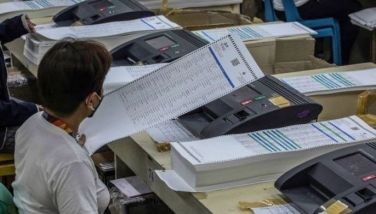Local execs stalling Yolanda aid to be held accountable
MANILA, Philippines - Local officials found stalling relief and rehabilitation efforts in areas affected by Super Typhoon Yolanda would be held accountable, Malacañang warned yesterday amid reports that politicking had deprived some survivors of much-needed aid from government after the disaster.
“Mayors and local officials (are) still subject to DILG (Department of the Interior and Local Government) discipline,†Presidential Communications Operations Office Secretary Herminio Coloma Jr. said. “Local units report to, and are accountable to, the national organization.â€
He explained the National Disaster Risk Reduction and Management Council’s “structure is in place†to ensure smooth relief operations as well as proper monitoring of the progress of rehabilitation activities including recovery, identification and burial of bodies.
More than 1,000 bodies remain unburied in Tacloban City led by Mayor Alfred Romualdez.
Coloma said the Department of Social Welfare and Development (DSWD) ensures that those still in evacuation centers get food packs, while the Department of Public Works and Highways (DPWH) makes sure there are enough bunkhouses for those displaced.
He added it’s rehabilitation czar Panfilo Lacson’s task to supervise reconstruction while the National Bureau of Investigation (NBI) and the Department of Health (DOH) handle the identification and burying of bodies in coordination with local government units, Coloma added.
Based on reports, political squabbling and patronage were at play even in small villages, so much so that some families received assistance only from charity organizations and the local church but hardly from the government.
Earlier, a resident of a small barangay complained about not receiving aid from the government because of an ongoing feud between Palo, Leyte Mayor Remedios Petilla – the mother of both the provincial governor and energy secretary – and Guindapunan barangay chief Annalisa Yu, an ally of two nephews of former first lady Imelda Marcos.
Politicking, lack of coordination and corruption have been cited as main hindrances to speedy and effective relief, rehabilitation and reconstruction efforts in areas affected by disasters.
These are the challenges that President Aquino aims to hurdle with his appointment of Lacson as rehabilitation czar.
Aquino said rehabilitation efforts in Yolanda-ravaged areas are expected to be completed in 2017. Speaking at a forum at the Asian Institute of Management, Lacson said he was aiming to deliver “minimum must†for residents in devastated areas by Dec. 30, 2015.
By “minimum must,†Lacson meant establishment of “round-the-clock†hospitals, evacuation centers, school facilities, police and fire stations, as well as improved livelihood and agri-based projects.
Lacson is officially called Presidential Assistant for Rehabilitation and Recovery (PARR) Secretary.
Lacson added the rehabilitation work being coordinated by the PARR is purely private sector funded.
“We should delineate because we cannot co-mingle government funds with private funds. So we are trying to put up a fund that is managed and administered by the private sector,†he said.
“Experience will tell us that if the government is the one handling the project, there is a little inefficiency and delay because of the red tape,†he said.
PARR Undersecretary Danilo Antonio said local and international funding groups and institutions have expressed desire to contribute to the rehabilitation program.
He said PARR is scheduled to meet with various private sector groups on Jan. 7 to discuss details of the rehabilitation work.
“We are expecting heavy support as far as having development sponsors. We need a lot of big groups to support us so they could take charge of particular areas,†he said.
“This is nothing different from certain Metro Manila cities adopting certain towns, but this time it’s a bigger context,†he said.
The Reconstruction Assistance on Yolanda (RAY), the country’s biggest reconstruction effort since the end of World War II, is projected to cost around P360.9 billion ($8.17 billion), the bulk of which or P183.3 billion is earmarked for rebuilding homes until 2017.
The next biggest chunk, or around 19.56 percent of the total, will go to jobs and businesses.
The industry and services sector, which includes livelihood, enterprises and services, will require P70.6 billion.
Meanwhile, informal workers in Eastern Visayas – particularly pedicab and tricycle drivers – are seeking social protection and housing from government aside from alternative employment.
Partido ng Manggagawa (PM) said a group of tricycle and pedicab drivers has launched a campaign seeking more social protection and other support from the government for their long-term needs. including mandatory Social Security System (SSS) as well as PhilHealth coverage through national or local government sponsorship.
They are also seeking climate-resilient socialized housing program, financial assistance for motor repairs or acquisition of units as well as fuel subsidy. – With Mayen Jaymalin, Mike Frialde
- Latest
- Trending






























